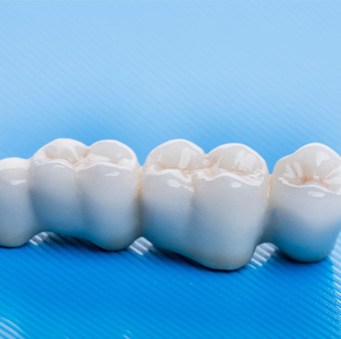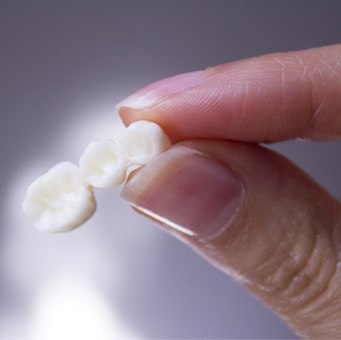
Dental Bridges – Vero Beach, FL
Missing a Tooth? We Can Fill the Gap

Losing just a single tooth, no matter which one it is, can lead to various daily struggles, such as a limited diet and unclear speech. Unfortunately, permanent teeth don’t grow back, so once there’s a gap in your smile, it’s there for good – unless, however, you seek help from a trusted dental professional! The prosthodontists at Premier Dental can replace your missing tooth or multiple missing teeth with a natural-looking dental bridge. Contact us today if you’re bothered by an incomplete grin.
Why Choose Premier Dental for Dental Bridges?
- Prosthodontists That Focus on Quality
- Natural-Looking Replacement Teeth
- In-House Dental Savings Plan
What is a Dental Bridge?

The same materials involved with making single crowns can be used to create dental bridges. Making a bridge involves combining a pair of dental crowns with prosthetic teeth called pontics. Once the crowns have been anchored to your natural teeth (or to dental implants in certain cases), the pontics can completely fill in the empty space and act as your new teeth.
Types of Dental Bridges

It’s not always obvious which kind of dental bridge you should get, but that’s why the experts at Premier Dental are here to help. We can take a look at your mouth and review your oral health history before recommending either a traditional bridge or one supported by implants. Both have benefits worth considering, so it’s important to choose the one that’s the best fit for your smile.
Traditional Dental Bridge
Traditional bridges use your natural teeth for support, which means adjustments have to be made to your enamel before they can be placed. An ideal candidate for a traditional dental bridge will be missing at least one tooth and will have strong natural teeth on either side of the space that needs to be filled.
Implant Bridge
With an implant bridge, your prosthetic teeth will be attached to titanium posts that have permanently fused with your jawbone. Dental implants have many advantages over traditional tooth replacement options. You may be able to get an implant bridge if you’re missing multiple teeth and have a healthy jawbone.
The Benefits of Getting a Dental Bridge

While you could simply choose not to replace your missing teeth, this decision is not without its consequences. On the other hand, replacing your missing teeth with a dental bridge comes with many important benefits:
- Your remaining teeth won’t drift out of place and become misaligned.
- You won’t have to be embarrassed about your smile anymore once the gap has been closed by a natural-looking dental bridge.
- A well-made dental bridge will improve your ability to chew different foods.
- Well-cared-for dental bridges can last for many years at a time.
- If you get an implant bridge, the stimulation from the implant posts will help put a stop to bone loss in your jaw.
Dental Bridge FAQs
Can You Take a Dental Bridge Out?
Since dental bridges are designed to stay in your mouth for years after they are placed, you should not be able to remove them without the help of a dental professional. This is because they are secured in the mouth either with dental crowns cemented to the healthy teeth on either side of the gap or with dental implants surgically placed in the jawbone. While partial dentures are sometimes called “removable bridges,” this is an inaccurate name for them since true dental bridges cannot be casually removed from the patient’s mouth.
How Long Should a Dental Bridge Last?
Dental bridges last between five and fifteen years on average, but this can vary based on what material your bridge is made from and how well you take care of it. While metal dental bridges may last longer than metal-free ones, this does not always happen and the difference is usually negligible. Good habits such as a healthy diet and proper oral hygiene can help bridges last longer while bad ones such as nail-biting, chewing ice, teeth grinding, and smoking can cause them to fail sooner. Bridges that replace teeth in the front of the mouth usually last slightly longer than those in the back because they bear less chewing pressure. If you have an implant bridge, it is likely to last longer than a traditional bridge, and while the restoration itself will have to be replaced, the implants may last for several decades with the appropriate care.
How Many Teeth Can a Dental Bridge Replace?
Dental bridges can be used to replace one to four consecutive missing teeth, but they are usually used to replace only one or two. This is because longer bridges tend to be less stable, especially if the natural teeth supporting them are not strong and healthy. It’s often risky to use a bridge to restore three or more teeth. However, implant bridges can lower this risk since dental implants are just as strong and secure as real teeth.
Can Dental Bridges Get Cavities?
While it’s impossible for dental bridges to develop cavities, the teeth supporting them still can. In some cases, food debris accumulates beneath the artificial teeth or in the space between the crowns and the gums, creating a safe space for the harmful bacteria that cause tooth decay and other oral infections to multiply. In some cases, the cement holding an older bridge in place can begin to corrode, providing more breeding ground for these harmful bacteria. These issues are particularly likely if the patient doesn’t practice proper oral hygiene, making it crucial to carefully clean around and under your bridge daily.